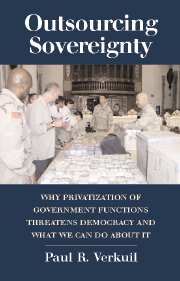 Outsourcing Sovereignty
Outsourcing Sovereignty Book contents
- Frontmatter
- Contents
- Acknowledgments
- Chart
- 1 Introduction and Overview – Why Outsourcing Threatens Democracy
- 2 The Outsourcing of Sovereignty
- 3 Case Study: Public and Private Approaches to Transportation Security
- 4 The Public-Private Distinction
- 5 The Case for Constitutional Governance
- 6 Statutory and Administrative Limitations on Private Delegations
- 7 Outsourcing Government Services: Contract Theory and Practice
- 8 Structural Reforms to Government
- 9 Conclusions (Wherein the Principal Instructs Her Agents)
- Cases
- Bibliography
- Index
1 - Introduction and Overview – Why Outsourcing Threatens Democracy
Published online by Cambridge University Press: 27 July 2009
- Frontmatter
- Contents
- Acknowledgments
- Chart
- 1 Introduction and Overview – Why Outsourcing Threatens Democracy
- 2 The Outsourcing of Sovereignty
- 3 Case Study: Public and Private Approaches to Transportation Security
- 4 The Public-Private Distinction
- 5 The Case for Constitutional Governance
- 6 Statutory and Administrative Limitations on Private Delegations
- 7 Outsourcing Government Services: Contract Theory and Practice
- 8 Structural Reforms to Government
- 9 Conclusions (Wherein the Principal Instructs Her Agents)
- Cases
- Bibliography
- Index
Summary
CONCERNS OF THIS BOOK
The government exercises sovereign powers. When those powers are delegated to outsiders, the capacity to govern is undermined. A government appointment creates a public servant who, whether through the oath, the security clearance, the desire to achieve public goals, or the psychic income of service, is different from those in the private sector. The office itself is honored. This is why many in our democratic system live in a dual reality, decrying the president, whether it be Bush or Clinton, Reagan or Roosevelt, but respecting the presidency, the office of George Washington, the first among the heroes of our Republic. Those offices that fall under the president deserve similar respect. Anyone who has served in government, from a buck private to a cabinet official, knows this feeling. And they also know that the public and private sectors have different boundaries. Outsourcing tests these boundaries. By doing so, it pushes government to justify delegations of public power to private hands.
One of the challenges of this book is to show exactly when public power has been transferred. By way of introduction, consider one statistic – security clearances. These are key indicators of public responsibility, reflecting the exercise of important duties and realized only after careful investigations by federal officials. Currently over eight hundred thousand contractors have security clearances at eleven thousand government facilities. That may be more than exist on the civilian side of government.
- Type
- Chapter
- Information
- Outsourcing SovereigntyWhy Privatization of Government Functions Threatens Democracy and What We Can Do about It, pp. 1 - 22Publisher: Cambridge University PressPrint publication year: 2007


